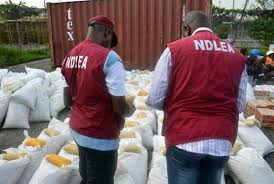The National Drug Law Enforcement Agency (NDLEA) has disclosed that it intercepted 14 containers loaded with various psychotropic drugs at the Apapa Seaport in Lagos between June 2024 and June 2025. The agency made the announcement during the grand finale of the 2025 International Day Against Drug Abuse and Illicit Trafficking, held in Apapa on Thursday.
Speaking at the event, the Assistant Commander-General of Narcotics, Buba Wakawa, said the Apapa Strategic Seaport Command of the NDLEA made major seizures within the last 12 months, highlighting the increasing use of maritime routes for the importation of hard drugs into Nigeria.
According to Wakawa, among the seized drugs were 774,635 bottles of codeine-based cough syrup and 36,652,460 tablets of tramadol, with a combined gross weight of 131,920.7 kilograms, approximately 132 tonnes. These drugs are listed as controlled substances due to their abuse potential and dangerous side effects when used without proper medical supervision.
Wakawa described the seizures as evidence of the rising scale of drug trafficking through Nigerian ports, stressing that the NDLEA remains committed to dismantling drug syndicates using the maritime sector for illegal drug movement.
He made the remarks during the awareness event which carried the global theme, “Evidence Is Clear: Invest in Prevention, Break the Cycle.” The campaign, driven by the United Nations, aims to raise global consciousness on the dangers of drug abuse and illicit trafficking. The NDLEA used the opportunity to call for joint efforts in breaking the cycle of addiction and smuggling.
“The Apapa Command seized 14 containers with different types of psychotropic drugs between June 2024 and June 2025,” Wakawa said. “This confirms that traffickers are still exploiting our maritime infrastructure to import banned substances. But we are watching, and we will intercept every one of them.”
He noted that according to a 2018 United Nations drug survey, over 14.3 million Nigerians aged between 15 and 64 had used drugs in the previous year. He said the figure paints a disturbing picture of the extent of drug use in the country and should prompt urgent action from all sectors of society.
He also linked the seizures and rising abuse to increasing levels of insecurity and social decay in the country. “The presence of illicit drugs has a direct impact on violence, criminality, and insecurity. This is why we must not allow the maritime corridors to be converted into safe zones for drug barons.”
Wakawa also commended the support of the Chairman and Chief Executive of NDLEA, Brigadier General Buba Marwa (retd.), whose War Against Drug Abuse (WADA) initiative has been spreading awareness across different sectors of society. According to him, the 2025 theme aligns closely with WADA’s core mission.
He explained that the NDLEA’s strategy now includes taking the campaign to seaport workers, shipping agents, terminal operators, students, schools, and the youth population—those considered most vulnerable to drug influence. The event in Apapa was meant to reinforce this outreach to the port community and other maritime stakeholders.
While commending legitimate maritime operators, Wakawa stressed that the sector’s wealth-generating potential also makes it a high-risk zone for criminal exploitation. “Yes, the maritime sector is key to any country’s economy,” he said. “But we must never allow unscrupulous individuals to hijack it and use it to push poison into our society.”
He decried how certain drugs originally created for medical treatment—such as tramadol and codeine syrups—have been repurposed by abusers for recreational highs and performance enhancement. “They were made to heal, but now people use them to feel high, to party, or to escape reality. This is unacceptable.”
He warned that the NDLEA will not tolerate any attempt to turn the country’s seaports into drug trafficking channels, urging all port stakeholders to work with the agency to secure the maritime borders.
“The fight is not for NDLEA alone,” he said. “We must all rise—customs, port managers, shipping lines, students, parents, and communities. The common enemies are the traffickers, the peddlers, the barons. They trade our future for wealth and must be stopped.”
Wakawa concluded by saying that it is only through unity and investment in prevention that the cycle of drug abuse and trafficking can be broken in Nigeria.
